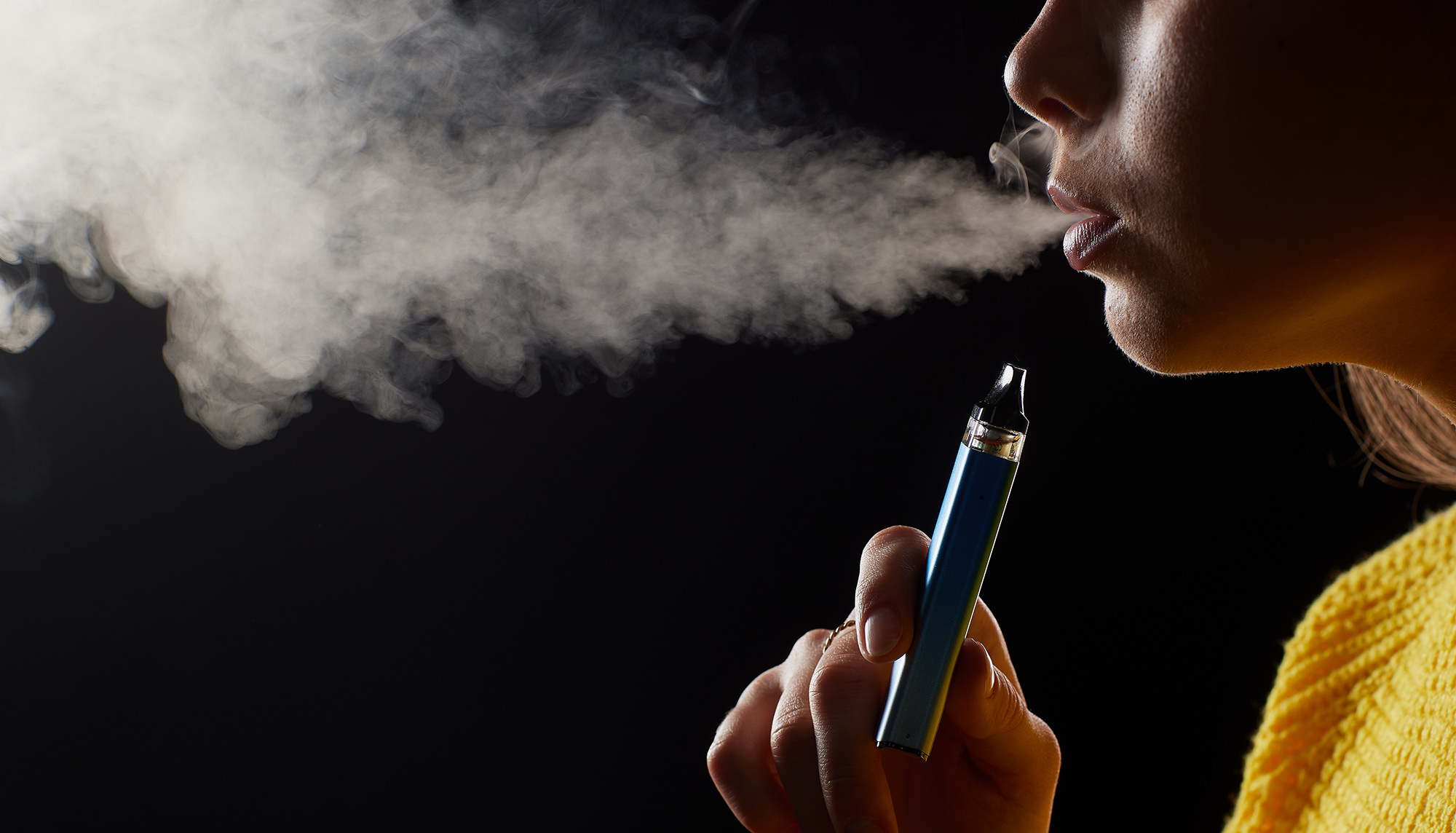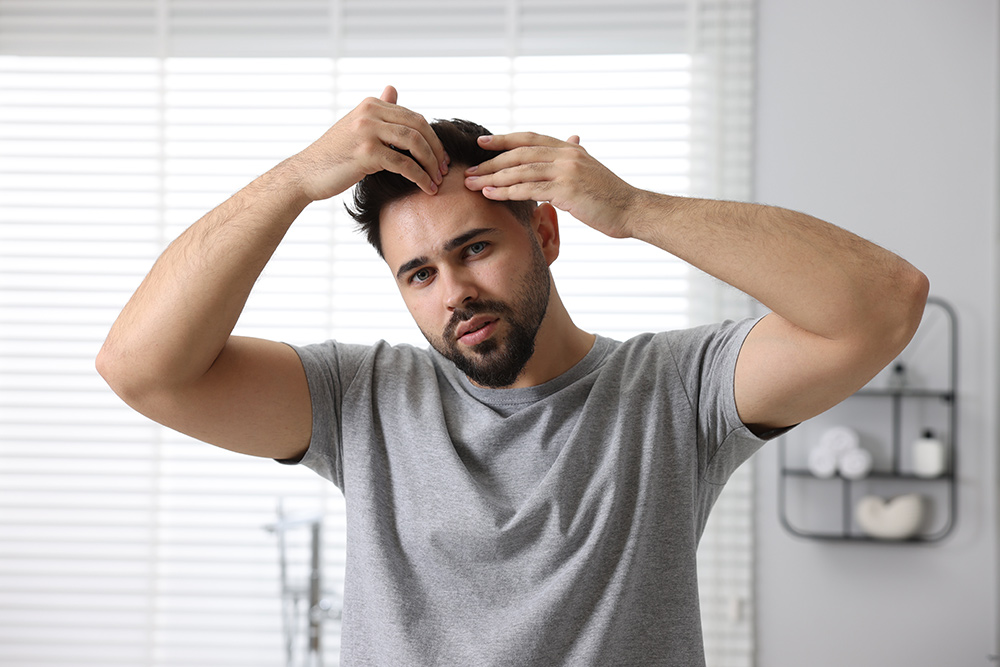Vaping and Hair Loss: What Every Smoker Should Know
Last updated on August 19, 2025
Vaping has often been marketed as the “healthier” alternative to traditional smoking. It smells better and comes in just about every flavor imaginable. But while it’s easy to assume that vaping is a safer habit, the truth is more complicated—especially when it comes to your hair health and hair growth. If you’ve been noticing more shedding, thinning, or slower regrowth and you vape regularly, your habit might be playing a bigger role than you think. Let’s break down what the science says about vaping and hair loss, and what you can do about it.
Does Vaping Cause Hair Loss?
While there’s no direct research yet that states vaping causes hair loss, mounting evidence suggests a strong link between nicotine use and hair thinning, with smokers being significantly more likely to develop hair loss. Since most e-cigarettes contain nicotine—and plenty of other chemicals—you could be exposing your scalp and hair follicles to several known risk factors.
A study published in 2022 found that e-cigarette users reported higher rates of inflammation-related lung conditions compared to non-users, which can affect systems throughout the body—including your scalp and hair follicles.
In short: while vaping might not cause hair loss outright, it creates conditions in the body that can trigger or worsen it.
How Vaping May Contribute to Hair Loss
Let’s look at a few reasons vaping could be contributing to your hair concerns:
1. Reduced Blood Circulation to the Scalp
Nicotine is a vasoconstrictor—it narrows your blood vessels and limits blood flow. When this happens, the tiny capillaries that supply oxygen and nutrients to your scalp become less efficient. Over time, reduced circulation can weaken hair follicles, slow growth, and lead to shedding.
2. Increased Oxidative Stress
Many of the chemicals found in vape liquid—including formaldehyde and acrolein—generate free radicals in the body. These unstable molecules can damage cells, accelerate aging, and lead to oxidative stress, which has been directly linked to hair follicle aging and miniaturization.
A 2021 review highlighted how oxidative stress is a major contributor to both male and female pattern hair loss.
3. Inflammation
Inflammation is your body’s natural defense system—but chronic inflammation can harm rather than heal. Studies show that vaping can increase markers of systemic inflammation, which can disrupt the hair growth cycle and push follicles into a resting (shedding) phase.
Are You More at Risk If You’re Genetically Prone to Hair Loss?
Yes. If you’re already predisposed to androgenetic alopecia (male or female pattern hair loss), vaping can accelerate the process.
Think of your hair follicles like plants. If they’re already sensitive or struggling, reducing their oxygen and nutrients makes things worse. Add inflammation and oxidative stress to the mix, and you’re creating the perfect environment for hair to thin more quickly.
What About Nicotine-Free Vapes?
You might assume that switching to a nicotine-free vape solves the problem—but it’s not that simple.
Even without nicotine, vape aerosols contain substances like propylene glycol, vegetable glycerin, and flavoring agents, many of which have not been studied long-term. Some ingredients may trigger allergic reactions, irritation, or inflammation, all of which can affect scalp health and hair retention.
Other Lifestyle Factors That Combine with Vaping
Vaping rarely happens in a vacuum. Many who vape also experience high levels of stress, inconsistent sleep, or poor nutrition—all of which contribute to hair thinning.
- Poor sleep disrupts hormone balance and cellular repair.
- Stress can trigger telogen effluvium, a form of temporary hair loss.
- Nutritional deficiencies, especially in iron, zinc, and vitamin D, impair hair health.
What Can You Do If You Vape and Are Losing Hair?
The first step is to take a full look at your lifestyle, habits, and medical history. Hair loss is rarely caused by a single factor—it’s usually the result of several things happening at once. Here’s what you can do:
1. Book a Free Hair and Scalp Evaluation
At our hair loss clinic in Raleigh, North Carolina, we offer free consultations to assess the health of your scalp, hair follicles, and potential contributing factors. Whether your hair loss is sudden or gradual, we can help pinpoint what’s going on.
2. Reduce or Quit Vaping
If you’re serious about keeping your hair, reducing or quitting vaping is a strong move. Nicotine replacement therapies, counseling, and support groups can all help you transition away from vaping more easily.
3. Support Hair Regrowth
Depending on the cause and stage of your hair loss, you may be a candidate for:
- Growth Factor Therapy – A non-surgical option using your body’s natural proteins to stimulate hair growth.
- FUE or FUT Hair Transplants – This ensures permanent hair restoration in transplanted areas for both men and women.
- Medical treatments – Tailored options like prescription medications and exosome treatments that help preserve existing hair and encourage regrowth.
Your Hair Reflects Your Health
Your hair is more than just something you style—it’s a reflection of what’s happening inside your body. Vaping might seem harmless, but its impact on circulation, inflammation, and cell health can quietly damage your scalp and hair over time.
If you’re concerned about hair loss, don’t wait. At AZ Hair Restoration in Raleigh, we combine advanced diagnostic tools with decades of experience to give you answers—and real results. Whether you’re ready to quit vaping, explore treatment options, or simply want to understand your hair better, we’re here to help.
Book your free consultation today and take the first step toward restoring your hair and your health.
FAQs
How does nicotine in vapes affect my hair growth?
Nicotine is a vasoconstrictor, which means it narrows blood vessels and limits oxygen and nutrient delivery to the scalp. Without proper blood flow, your hair follicles may weaken and shrink, eventually leading to slower growth or increased shedding. If you’re vaping daily and noticing more hair fall, nicotine may be playing a key role in reducing the health of your scalp and hair over time. Looking for medical hair loss treatments? AZ Hair Restoration can help you!
Is hair loss from vaping permanent?
In some cases, hair loss from vaping can be reversed—especially if you stop early and support your scalp’s recovery. However, if vaping accelerates genetic hair loss or damages follicles over a long period, it may become permanent. Early intervention is key. At our Raleigh hair restoration clinic, we offer free consultations to assess the extent of damage and recommend effective medical regrowth treatments or surgical restoration options.
Does switching to nicotine-free vapes stop hair loss?
Nicotine-free vapes may or may not reduce the risk of hair loss, but they’re not risk-free. Many e-liquids contain chemicals like propylene glycol and formaldehyde, which are still vaporized to very high temperatures and can still contribute to inflammation or oxidative stress—both of which impact hair follicle function. If you’ve switched and are still seeing thinning or breakage, a free professional scalp evaluation can help identify if vaping or other factors are at play.
Can I reverse vape-related hair damage with treatment?
Yes—many people see improvement by stopping vaping ASAP. If your hair loss is linked to vaping, options like Growth Factor Therapy, FUE or FUT transplants, and targeted medical care can help restore hair health. The sooner you address the problem, the better your chances. AZ Hair Restoration in Raleigh, NC, offers free consultations to help you understand the cause and develop a treatment plan that works for you.
How soon after quitting vaping will hair start to regrow?
If your hair follicles are still active, you may notice regrowth within 3 to 6 months after quitting vaping. However, timelines vary depending on your overall health, genetics, and how long you’ve been vaping or smoking. Supporting your scalp with treatments like Growth Factor Treatment or exosomes for hair loss can improve the rate and quality of regrowth. At AZ Hair Restoration, we provide free hair transplantation consultations.









